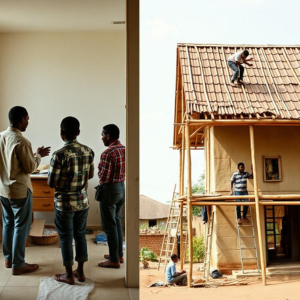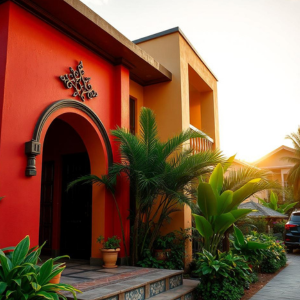Introduction
Buying land in Ghana? Save thousands and sleep easy when you follow these steps to buying land in Ghana. With rapid urbanisation, steady population growth, and increased demand for housing and commercial spaces, land values continue to appreciate nationwide. From the bustling streets of Accra to the rapidly developing hubs of Kumasi and Takoradi, land ownership promises both security and long-term wealth. According to recent reports, land prices in key areas, such as Accra, increased by approximately 15% last year alone, reflecting strong demand and promising potential for future growth in the real estate market.
However, buying land in Ghana is not always straightforward. Many investors, both local and from abroad, have lost money to scams, double sales, and ongoing disputes. Failing to conduct proper checks can result in lengthy court battles, financial losses, and stress.
The good news? With the proper steps, you can confidently secure land in Ghana without falling into common traps. In this guide, we’ll walk you through the seven critical steps every intelligent investor must take to avoid scams and protect their investment. First, we’ll set clear goals and establish a budget, then we’ll explore how to choose the correct location. We’ll also cover how to verify land ownership, conduct essential land searches, and involve a qualified lawyer. Finally, we’ll discuss negotiating a proper sales agreement and the importance of registering the land in your name. Let’s dive into each step for a successful land purchase.
Step 1: Define Your Purpose and Budget
Before you even start looking at plots of land, you need clarity. Are you buying land to:
- Build your dream home?
- Start a commercial project (shops, apartments, or warehouses)?
- Farm or invest for the future resale value?
Your purpose will shape everything—from location to documentation requirements.
Tip: Don’t just budget for the land itself. You’ll also need to account for:
- Survey fees
- Legal fees
- Land search and registration at the Lands Commission
- Possible community or traditional authority charges
Ignoring these hidden costs is a common mistake that leads to stalled projects. To help budget more realistically, you should expect survey fees to range between $200 and $500, legal fees to average around $300 to $700, and registration at the Lands Commission to vary from $100 to $150. Note that these are ballpark figures, and actual costs can be influenced by different factors such as location and the professionals you hire.
Step 2: Choose the Right Location
In real estate, location is everything.
- Prime areas like East Legon, Cantonments, and Airport Residential in Accra are costly but come with high resale value.
- Developing areas such as Kasoa, Dodowa, and Pokuase offer more affordable plots but may require patience for full development.
- Regional cities like Kumasi, Takoradi, and Tamale present growing opportunities due to industrial expansion and population growth.
When choosing a location, consider:
- Road access and transportation
- Proximity to schools, hospitals, and markets
- Risk of flooding or poor drainage
- Security and neighbourhood reputation
Red flag: Avoid buying land that seems “too cheap to be true.” Often, such plots are disputed, unregistered, or located in high-risk zones.
Step 3: Verify the Land Ownership
This is the step where many buyers go wrong. In Ghana, land ownership can be complex:
- Stool land (owned by chiefs/traditional authorities)
- Family land (controlled by clans or families)
- Government land (reserved for state use or already acquired for projects)
- Private land (individually owned, often easier to verify)
Unfortunately, some landowners sell the same plot to multiple buyers. Others may not even have full rights to the land they are selling.
Action: Always demand ownership documents, including a site plan and indenture. Cross-check them with official authorities before making any payments. To verify these documents, first, visit the Lands Commission. Submit copies of the papers alongside an application form and the required fee to confirm their validity. It may also be helpful to consult a licensed surveyor to ensure that the site plan aligns with existing records and documentation. Be aware that presenting fake documents or incomplete signatures can result in severe legal consequences, including fines and imprisonment. By taking these steps, you increase the security of your investment.
Step 4: Conduct a Land Search at the Lands Commission
Never skip this step. It is your legal protection.
A land search at the Lands Commission helps you confirm:
- Whether the land is registered.
- The rightful owner’s details.
- Whether the land is under litigation, government acquisition, or has already been sold.
The process typically requires:
- A copy of the site plan (bearing a valid surveyor’s stamp).
- Application forms and fees. Once the search is completed, the Lands Commission will provide an official search report or certificate. This printout will detail critical information, including the ownership status, registration details, and any existing disputes or encumbrances affecting the land. It is essential to review this document carefully to ensure that all information aligns with previously verified details. If the certificate indicates any disputes or issues, seek clarification from the Lands Commission or consult your lawyer for guidance.
It typically takes between 2 and 6 weeks to complete a land search, but it’s worth the wait. Many land disputes could have been avoided if buyers had conducted thorough searches.
Step 5: Involve a Qualified Lawyer
Hiring a lawyer may feel like an unnecessary expense, but it’s one of the best investments you can make in the land-buying process.
A qualified real estate lawyer will:
- Verify all documents and signatures.
- Draft or review the sales agreement.
- Ensure the transaction complies with Ghanaian property laws and regulations.
Many buyers rely only on agents or sellers, which can leave them unprotected. Remember, your lawyer is there to look out for your interests, not the seller’s. To find a qualified real estate lawyer in Ghana, consider contacting the Ghana Bar Association for recommendations. Seeking referrals from friends or colleagues who have successfully purchased land can also be helpful. Additionally, ensure the lawyer has experience in real estate transactions and is familiar with the specific legal landscape in Ghana.
Step 6: Negotiate and Sign a Proper Sales Agreement
A handshake or verbal promise is not enough when land is involved.
A proper sales agreement should include:
- Full names and details of the buyer and seller
- Land location and boundaries (with GPS coordinates if possible)
- Payment terms and receipts
- Witnesses (both buyer’s and seller’s sides)
- Official stamps or notary seals
Also, ensure the land is physically demarcated with boundary pillars to avoid future disputes with neighbours.
Step 7: Register the Land in Your Name
The final and most crucial step is registering your land at the Lands Commission.
Registration gives you:
- Legal proof of ownership
- The right to resell, lease, or develop the land
- The ability to use the land as collateral for loans
Without registration, you risk losing your land even after paying for it. Don’t postpone this step.
To register your land, follow these steps:
- Obtain the necessary forms from the Lands Commission office.
- Submit the completed forms along with required documents like a site plan and indenture.
- Pay the registration fee, which varies based on location and plot size.
- The Lands Commission will verify the documents and conduct a site inspection.
- Upon successful verification, your land will be officially registered in your name, and you will receive a land title certificate.
Common Mistakes First-Time Buyers Make
- Relying on verbal promises instead of written agreements.
- Paying money without proper receipts or documentation.
- Buying land that belongs to multiple families in dispute.
- Trusting intermediaries or agents without verification.
Avoiding these mistakes will save you years of frustration.
Conclusion
Buying land in Ghana is a significant investment that requires careful planning and patience. If you follow these seven steps—defining your purpose, choosing the correct location, verifying ownership, conducting a land search, hiring a lawyer, signing a proper agreement, and registering your land—you can avoid fraud and secure your future.
Remember: land is permanent, but mistakes in acquiring it can last a lifetime. Do your due diligence today, and you’ll enjoy peace of mind tomorrow. To take decisive action, why not schedule your first visit to the Lands Commission this week? Transform your knowledge into reality and ensure your investment is secure.
Frequently Asked Questions (FAQ)
- How much does it cost to buy land in Ghana?
Ama, a nurse in Kumasi, pondered the costs of purchasing land as she planned her future home. Prices vary a lot. Plots in prime city areas can cost thousands of dollars, while land in rural or developing areas is often much more affordable. - Can foreigners buy land in Ghana?
John, an expatriate entrepreneur, was interested in owning property in Ghana. Foreigners cannot own land outright; however, they can lease land (typically for up to 50 years) with renewable terms. - How long does it take to register land in Ghana?
As Kwame prepared to build his family’s house, he needed to know how long the registration process would take. Registration may take 3–6 months, depending on the workload of the Lands Commission and the accuracy of the submitted documents. - What documents should I ask for before buying land?
Before making any commitments, Maria, a first-time buyer, needed a checklist of essential documents. Site plan, indenture, land title certificate (if available), and proof of ownership from the seller. - Who should I contact to verify land ownership?
Kwesi wanted to confirm the legitimacy of a land offer he had received, involving the Lands Commission, a licensed surveyor, and a qualified real estate lawyer.


